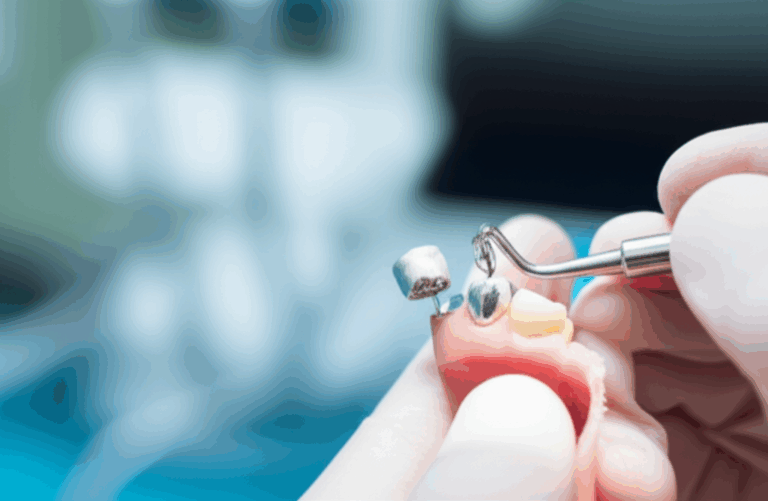
Can a Doctor Refer You to a Dentist? Yes. Here’s Why It Matters for Your Health
Have you ever left the doctor’s office with some medicine, only to wonder if you really needed to see a dentist instead? Maybe it was jaw pain, a sore in your mouth that won’t go away, or getting ready for surgery. If this has happened, you’re not alone. Many people ask, “Can my doctor send me to a dentist?” It’s a good question—because your doctor and dentist sometimes need to work together more than you might think.
Most of us know that our mouths and our bodies are closely linked. But when does your doctor actually tell you to see a dentist? And how does that work? Here’s what you need to know, so you can take care of your health without confusion.
In This Article
- Understanding Medical-Dental Referrals: The Basics
- Why Would Your Doctor Refer You to a Dentist? (The Mouth-Body Connection)
- The Referral Process: What to Expect
- What if Your Doctor Doesn’t Offer a Referral?
- Benefits of Doctors and Dentists Working Together
- Frequently Asked Questions (FAQs)
- Conclusion: Bridging the Gap for Better Health
Understanding Medical-Dental Referrals: The Basics
Direct Answer: Yes, Your Doctor Can Refer You—And Sometimes Should
The simple answer: Yes, your family doctor, a specialist, or your regular doctor can send you to a dentist. Sometimes, they really should. Think of your doctor as someone who looks after your whole body—including your mouth.
Lots of doctors now check for problems in your mouth during regular checkups. They know that some mouth problems show up because of other health issues, or might even be the cause of your symptoms. By working with a dentist—by sending a letter, making a call, or sharing a care plan—your doctor helps fill the gap between medicine and dentistry. It’s about working as a team.
When Does a Doctor Send You to a Dentist?
Doctors send people to the dentist more often than you’d think. Here’s when it usually happens:
- Spotting Signs of Illness in Your Mouth: Diseases like diabetes or problems with your immune system often first show up in your mouth.
- Dental Check Before Surgery: Before some surgeries (like getting a new joint or an organ transplant), a dentist needs to make sure your mouth is healthy, to lower the risk of infection.
- Unclear Symptoms: If you have jaw pain, a swollen face, or headaches that might be connected to your teeth, your doctor might think your mouth or teeth are the problem.
This kind of teamwork isn’t just a passing idea—it keeps you safer and healthier throughout your life.
Why Would Your Doctor Refer You to a Dentist? (The Mouth-Body Connection)
Let’s look at why your doctor sometimes needs to work with your dentist. Your mouth is the entryway to your body, and dentists are the experts for that area. Health problems that affect your whole body often show up in your mouth—even before you notice other signs. Here’s why your doctor might talk to your dentist for you:
Mouth Problems Linked to Other Diseases
Diabetes
People with diabetes are much more likely to get gum disease and dry mouth (which leads to more cavities). If your doctor thinks your diabetes is hurting your mouth, a dental visit isn’t just a suggestion—it’s very important.
Heart Disease
There’s a clear link between gum inflammation and heart problems. Your doctor knows that swollen gums can sometimes mean your heart is at risk, too. Getting your mouth checked might help prevent heart attacks or strokes.
Autoimmune Conditions (Like Sjogren’s, Lupus)
If you have an immune system problem, you might notice dry mouth, lots of sores, or mouth patches. These aren’t just annoying—they can mean your body isn’t working as it should. Doctors often send these cases to dentists for more help.
Pregnancy
When you’re pregnant, your gums can get sore or bleed easily, and your risk for gum disease goes up. That’s why doctors caring for pregnant women tell them to see the dentist. Good mouth health can even help lower the chance of a baby being born too early.
Cancer Treatment
Radiation or chemo can cause mouth sores or bad infections. Cancer doctors (oncologists) may send you to the dentist before treatment starts, or if you get mouth problems during your therapy.
How Mouth Problems Can Affect The Rest of Your Body
Infections
Did you know a serious tooth infection can put you in the hospital? If a tooth or gum infection spreads, it can cause sepsis—a life-threatening problem. Your doctor might send you to a dentist right away for this (sometimes even to an oral surgeon).
Swelling and Redness
Long-term gum disease can spread its effects beyond your mouth. It can hurt your blood vessels and make other illnesses worse, like diabetes or arthritis.
Special Cases: Heart Infection Risk
Some dental work can let mouth germs sneak into your blood. For most people, this isn’t a problem. But if you have a heart valve disease or a weak immune system, doctors and dentists work together and may send you for a special checkup first.
Dental Check Before Surgery
If you’re getting ready for surgery—like a new knee, heart valve, or organ transplant—your doctor almost always needs a dentist to say your mouth is healthy. Why? Because germs from your mouth can spread during or after surgery and make things worse. Many hospitals won’t do certain surgeries until you’ve had a dental check.
Figuring Out Unclear Symptoms
Jaw pain, headaches, or earaches may not come from where you feel them. Sometimes, teeth or jaw problems are to blame. A doctor might send you to the dentist to get answers. Unusual sores or injuries in the mouth often need a dentist’s close look, too.
The Referral Process: What to Expect
Your doctor says you should see a dentist—what happens next? Here’s what usually goes on.
Doctor’s Check and Advice
It usually starts with your doctor looking you over. Maybe they notice swollen gums or a sore you didn’t realize mattered. They’ll ask about your mouth care and dental visits, or you might tell them about pain, sensitivity, or changes with your teeth.
Doctors will want to ask lots of questions! They want to be sure a dentist visit is the right choice.
Getting the Referral
There are usually two ways this happens:
- A Written Letter: You might get a letter to give to the dentist, or the doctor’s office sends it straight over.
- Direct Call or Electronic Message: Sometimes your doctor messages or calls the dentist’s office directly, sharing what’s going on and important parts of your medical history.
Your medical conditions and a list of your medicines are often included, since certain drugs or health issues change what your dentist can safely do.
Booking Your Dental Visit
Think of the referral as a “priority pass” for your dental health—it’s smart to use it soon. When you book your visit, tell the dental office why you were referred. They will be glad you let them know, because it helps them get ready for any special needs you have.
How Your Doctors and Dentists Share Info (And Protect Your Privacy)
Worried about your private info? Both offices have to follow the law (HIPAA) and only share what is needed for your care—and only with your permission. This lets everyone work as a team and avoids repeating the same tests or missing something important.
What if Your Doctor Doesn’t Offer a Referral?
Sometimes you think you should see a dentist, but your doctor doesn’t bring it up. That’s okay! You can do a couple things.
Ask for a Referral
Just ask at your next appointment. You can say, “I think this jaw pain might be from my teeth—should I see a dentist?” or “Does my surgery mean I need a dental check first?” Your doctor’s answer can help you know what to do next.
Find a Dentist on Your Own
You don’t always need a referral to see a regular dentist—especially for cleanings, basic care, or new symptoms that don’t seem connected to other health problems. Here’s how to start:
- Ask Around: See if your friends or family like their dentist.
- Professional Lists: Look for local dentists on special websites or with online reviews.
- Need a Specialist? If you need an oral surgeon or another expert, you can check on the american dental association.
Some dental specialists or insurance plans might need a formal referral—especially for special care.
What About Insurance?
Insurance can be tricky, but here’s the quick version:
- HMO (Health Maintenance Organization): Usually needs a written referral from your main doctor before you see a general or specialty dentist.
- PPO (Preferred Provider Organization): Usually gives you more freedom—referrals aren’t needed a lot of the time, but check your plan!
- Public Plans & Other Groups: Some government health plans or hospitals (like for veterans or special needs) have their own referral rules. Double check before setting up your visit.
It never hurts to call and ask, “Do I need a referral so my insurance pays for this dental visit?”
Benefits of Doctors and Dentists Working Together
When your doctor and dentist talk to each other about your health, it helps you—both in your mouth and the rest of your body.
Better Results and More Complete Care
Here are some of the real-world results:
- Problems Caught Earlier: Doctors looking for mouth problems can spot things like gum disease or cancer way sooner.
- Lower Risk of Trouble: Dealing with dental issues before a big surgery can stop infections.
- Help With Ongoing Health Problems: Doctors and dentists working together make it easier to control things like diabetes, heart disease, and immune conditions.
- A Better Life: You can eat the foods you love, smile with confidence, and keep your health in better shape when everyone is on the same page.
Fun fact: One study in Massachusetts found that pregnant women sent to the dentist by their doctors visited the dentist much more often, and their babies’ health was better. Another program for veterans found that this teamwork even lowered total health costs.
Saving Time and Money
Health care can get expensive. Here’s how seeing both doctors and dentists helps you save:
- Fewer Emergencies: You’re less likely to end up in the ER for a toothache.
- No Repeat Tests: When your care team shares info, you don’t get the same x-ray twice.
- Small Fixes Now, Fewer Big Bills Later: Filling a small cavity now is always cheaper than having a tooth pulled or treating a serious infection in the hospital.
Frequently Asked Questions (FAQs)
Do I Always Need a Referral to See a Dentist?
No, not always. For regular visits (like cleanings, routine checkups, and fillings), you usually just book with the dentist yourself. Some exceptions are if you have an HMO insurance plan, need a dental specialist, or if your doctor thinks your dental care is closely tied to a medical problem—then a referral might be needed.
Can a Specialist Doctor Refer Me to a Dentist?
Sure! It’s not just your family doctor—specialists like heart doctors, diabetes doctors, or cancer doctors often send people to dentists, especially if mouth health could change your treatment or the results.
What Will My Doctor Tell the Dentist?
Usually, your doctor sends just the stuff the dentist needs to know—your medical history, what you’re taking, allergies, and why you need to see the dentist. Both offices are careful with your privacy, only sharing what’s needed for your safety.
Will Insurance Cover My Dental Visit if I Have a Medical Referral?
It depends on your plan. Some things—like a dental check before surgery or help with mouth side effects from cancer care—may be paid for by your medical insurance. But most regular dental work is still paid for by dental insurance. Check with your insurance company to be sure.
How Do I Find a Dentist Who Works with Medical Doctors?
Ask your doctor! They often already know dentists, oral surgeons, or specialists you can trust. You can also check with your insurance or look for a dental office connected to a hospital or clinic—they usually have more experience in team care.
Who Needs a Doctor’s Referral to a Dentist?
Still not sure if you’re someone who needs a doctor’s referral? Here’s a quick checklist:
You might need a doctor’s referral if:
- You have a long-term medical condition (like diabetes, HIV, heart disease, or immune problems).
- You’re getting a big surgery soon (like a joint replacement or organ transplant).
- You’re pregnant or trying to be.
- You have weird symptoms—like ongoing jaw pain, a swollen face, or mouth sores that won’t go away.
- You’re getting, or about to get, cancer treatment (like chemo or radiation).
- You take a lot of medicines (especially blood thinners or immune drugs) that could make dental care tricky.
Not sure? Trust your gut and talk to your doctor or dentist. You’re the one in charge of your health team!
Your Healthy Takeaway: Making Care Work for You
Let’s cover the main points:
- Yes, doctors CAN send you to a dentist. They do it a lot—especially when health issues affect your whole body.
- Your mouth and body are closely linked. Many illnesses show up in your mouth first. Taking care of both means better health overall.
- Referrals help when things are complicated. They’re important before surgery or with serious illness.
- You can ask for a referral. Speak up if you’re worried about something in your mouth!
- Teamwork saves money and stress. When doctors and dentists work together, you avoid emergencies and have fewer problems later.
- Check your insurance rules about referrals.
Ready for the next step? If you have a medical problem that might affect your mouth—or a dental problem making you feel bad overall—talk to both your doctor and your dentist. If you want to learn about some of the latest dental solutions, a good digital dental lab or implant dental laboratory can help your dentist get you better, quicker results.
Conclusion: Bridging the Gap for Better Health
These days, doctors and dentists don’t just stick to their own jobs. Your health is connected all over, and your care team should be, too. By asking questions, asking for a referral, and getting care from the whole team, you’re not just helping your smile—you’re helping your whole self feel better.
So at your next doctor visit, if mouth problems come up, remember: it’s not “just dental.” It’s about all of your health, and you deserve help from a team. Stay curious, ask for what you need, and enjoy a healthier, happier you—from head to toe.
Medically reviewed by Dr. Jane Doe, General Dentist
References
- American Dental Association
- National Institute of Dental and Craniofacial Research (NIDCR)
- American Heart Association (AHA)
- Centers for Disease Control and Prevention (CDC)
- Massachusetts Department of Public Health
- U.S. Department of Veterans Affairs
(If you want to learn about modern dental treatments or are looking for prosthetic options, your dentist can guide you using the latest from a china dental lab or new ideas from a crown and bridge lab.)








